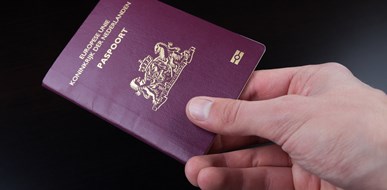[Interview] Counterterrorism expert Christophe Paulussen critisises citizenship stripping for terrorists and calls for evidence-based approach
Published 23 May 2024
@iStock
In an interview with Dutch media organisation De Kanttekening, counterterrorism expert Dr Christophe Paulussen calls for a more evidence-based approach to counterterrorism policy. In the article, Paulussen reflects on plans to revoke the citizenship of convicted terrorists, according to the Coalition Agreement (‘Hoofdlijnenakkoord’) presented last week. “A dangerous trend”, according to Paulussen, who calls the plans “purely symbolic politics” and “muscle-flexing rhetoric”.
The proposed “Coalition Agreement” (het “Hoofdlijnenakkoord”) is a political agreement between the four parties BBB, NSC, VVD and PVV that will probably form the next Dutch government. The plan states that the cabinet wants to investigate whether and how Dutch citizenship can be taken away from convicted terrorists. Paulussen calls this a dangerous trend. Nationality stripping is already possible for people with dual nationality, but the new coalition apparently wants to extend this measure to people with only Dutch nationality, Paulussen thinks.
Convicted Syria returnees who have had their nationality revoked but have not left the Netherlands are disappearing into illegality, and are posing a security risk. Two years ago, the municipalities of Rotterdam, Amsterdam, Utrecht and The Hague already warned about this in a letter to the Dutch Minister of Justice and Security, Dilan Yesilgöz. Although there has been some thought since then about a pilot project to keep this group of people under surveillance, this is overshadowed by the new plans, which would only make the risk group larger.
Vocal critic
Christophe Paulussen, acting academic director and chair of the executive board of the Asser Institute and research fellow at the International Centre for Counter-Terrorism (ICCT), has long been a vocal critic of policies such as revoking the citizenship of suspected and convicted terrorists, arguing that such measures are more likely to create a two-tiered society and make reintegration actually more difficult rather than deter terrorism.
Citizenship-stripping of mono-citizens would further violate the international law obligation to prevent statelessness, while ensuring that potentially dangerous people fall off the radar as countries may refuse to take back their citizens. "Revoking citizenship is a dangerous precedent that could have a number of negative consequences," Paulussen thinks.
Muscle-flexing rhetoric
Paulussen: "I see the revocation of nationality as pure symbolic politics. A muscle-flexing rhetoric to show that these people no longer belong to the Netherlands and therefore must leave the country. (…) The consequence of this approach, however, is that you make potentially dangerous people the problem of other countries. You are expecting that another country will take responsibility over someone that you consider to be a risk. The idea that we simply throw our problem over the fence and thereby hope that it disappears, is also reprehensible from a moral point of view.'
Paulussen blames emotional responses for ineffective counterterrorism policies. Paulussen: "Unfortunately, in the world of counterterrorism, emotion often takes over from reason", adding that "It is the task of researchers to keep coming up with evidence-based insights and to keep advocating for the best measures from a moral, international legal and security perspective."
Evidence-based policies
Paulussen's call for evidence-based policy comes as governments around the world are grappling with the challenge of how to counter terrorism without sacrificing civil liberties. "We need to be careful not to let our fear of terrorism lead us to make decisions that will only make us less safe in the long run," Paulussen says. "We need to base our counterterrorism policies on evidence, not on emotion."
Paulussen argues that a more rational approach to counterterrorism is essential to protect both security and human rights. "Depending on the specific circumstances of a case, I believe that a contact ban or an area ban would be more appropriate. Revoking citizenship is an extremely drastic measure that has implications for various human rights. Your nationality gives you the ability to work, to live, and to be a citizen. The renowned philosopher Hannah Arendt spoke of “the right to have rights”. It is also often said that revoking citizenship leads to a 'civil death'. Moreover, (…) revoking nationality makes it impossible for aid workers to safely reintegrate individuals back into society. Therefore, this measure is highly problematic not only from a moral and international legal perspective but also from a security standpoint."
Paulussen urges policymakers to prioritise evidence-based solutions that address the root causes of terrorism while upholding human rights. “We should have faith in our professionals. Proper guidance and support in helping individuals who have been involved with terrorist organisations is very important. Critics might say: why should we help these people if they have joined a terrorist organisation? But what exactly do we want? A safe society, right? Then you have to do everything in your power to prevent potentially dangerous people from disappearing off the radar.”
Read the full interview. (in Dutch)
About Christophe Paulussen 
Dr Christophe Paulussen is acting chair of the executive board and academic director at the Asser Institute, and associate fellow ‘Rule of Law Responses to Terrorism’ at the International Centre for Counter-Terrorism - The Hague. (ICCT). He is also a senior researcher and coordinator of the Asser Institute's research strand 'In the public interest: accountability of the state and the prosecution of crimes'.
Read more
The book Returning foreign fighters: Responses, legal challenges and ways forward (T.M.C. Asser Press), by editors Francesca Capone, Christophe Paulussen and Rebecca Mignot-Mahdavi, zooms in on the responses by the international community and individual states to returning foreign fighters (FFs) and their families. The book focuses on foreign fighter returnees and their families from Syria and Iraq to European countries, and the responses by the international community and individual states to them. It addresses the fate of family members of perpetrators of violence, and the threat posed to European or other nations by conflict-hardened returnees who would need care and rehabilitation, but who might also constitute a genuine security threat to others. Read more.
[Op-ed] ‘UK, Australia and the Netherlands should not evade responsibility through citizenship stripping’
In Dutch newspaper de Volkskrant, Asser senior researcher Christophe Paulussen and ISI Co-Director Laura van Waas voice their opinion on citizenship stripping as a counter-terrorism measure. “The expulsion of a citizen from society may have great symbolic power, but that does not make him or her disappear from the globe.” Read more.
Citizenship stripping as a counter-terrorism measure is inefficient
Several states have been revoking national citizenships to fight terrorism. In Bahrain, for example, authorities have revoked hundreds of citizenships since 2012. Just today, the public prosecution in Bahrain ruled to revoke six additional citizenships bringing the total in 2018 alone to 243. Asser senior researcher and ICCT research fellow Dr Christophe Paulussen has also referred to the Bahraini case in his recently published ICCT Perspective “Countering Terrorism Through the Stripping of Citizenship: Ineffective and Counterproductive”. Read more.
Interested in terrorism, counterterrorism and the rule of law?
From Monday 26 to Friday 30 August 2024, the T.M.C. Asser Instituut and the International Centre for Counter-Terrorism (ICCT) will host the 14th Advanced summer programme on terrorism, counter-terrorism and the rule of law. In this thought-provoking summer training programme, you will focus on the international and domestic legal aspects of countering terrorism and violent extremism, in inspiring and interactive classes by leading academics and practitioners in the field. Register now as seats are limited! Read more.


